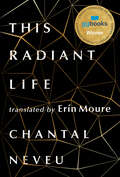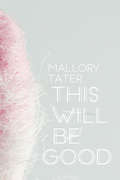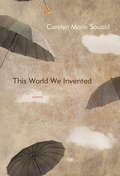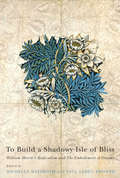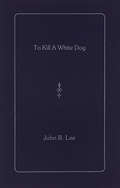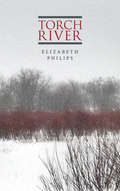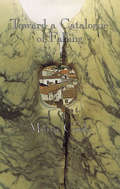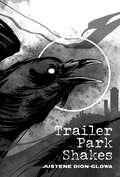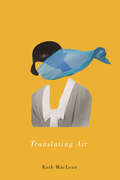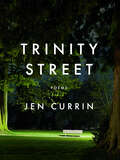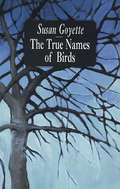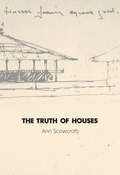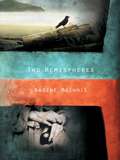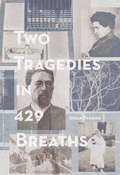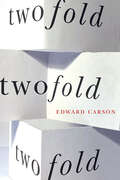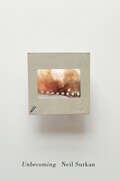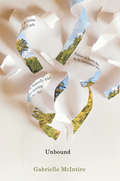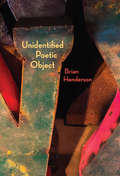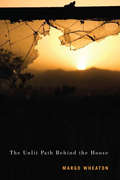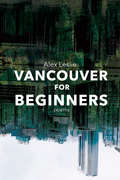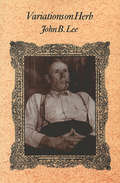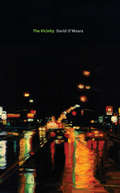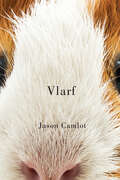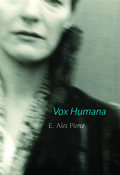- Table View
- List View
This Radiant Life
by Chantal NeveuIn this stunning long poem, Chantal Neveu draws from the lexicons of science, art, revolution and corporeal movement to forge intense and extended rhythms that invoke the elements and spaces making up our world. This is poetry capable of holding life and death, solidarity and love. Renewal. Breathing. In its brevity and persistence, This Radiant Life is a material call for action: it asks us to let go, even just a little bit, of our individuality in favour of mutuality, to arrive separately yet in unison at a radiance in which all living beings can thrive.
This Will Be Good
by Mallory TaterMallory Tater's This Will Be Good tells the story of a young woman’s burgeoning femininity as it brushes up against an emerging eating disorder. As the difficulties of her disease reveal themselves, they ultimately disrupt family relationships and friendships. These poems deftly bear witness to the performance of femininity and gender construction to reveal the shrinking mind and body of a girl trying to find her place in the world, and whose overflowing adolescent hope for a future will not subside.
This World We Invented
by Carolyn Marie SouaidThe world in Carolyn Marie Souaid’s latest collection is both an act of the imagination and a responsibility. Souaid’s poems zoom in and out, shifting focus to accommodate varied dimensions of experience. We move from the breakdown of a relationship to primordial ooze to a suicide bomb to a son doing his math homework. In a disarmingly personable voice, Souaid investigates our darker moments, faces up to losses and failures both intimate and public, often with wry humour. If our world is an imperfect invention, it is also, for Souaid, a source of wonder -- where “the trick was not to fall asleep but to notice everything / in its brevity.”
To Build a Shadowy Isle of Bliss: William Morris's Radicalism and the Embodiment of Dreams
by Michelle Weinroth Paul Leduc BrowneTo Build a Shadowy Isle of Bliss casts new light on the political radicalism and social thought of nineteenth-century artist, author, and revolutionary, William Morris. Standing on the cusp of a new wave of scholarship, this book presents an exciting convergence of views among internationally renowned scholars in the field of Victorian Studies. Balancing variety and unity, this collection reappraises Morris’s concept of social change and asks how we might think beyond the institutions and epistemologies of our time. Though the political significance of Morris’s creative work is often underestimated, the essays in this volume showcase its subtlety and sophistication. Each chapter discerns the power and novelty of Morris’s radicalism within his aesthetic creations and demonstrates how his most compelling political ideas bloomed wherever his dexterous hand had been at work - in wallpapers, floral borders, medievalist romances, and verse. Morris's theory and practice of aesthetic creation can be seen as the crucible of his entire philosophy of social change. In situating Morris's radicalism at the heart of his creative legacy, and in reanimating debates about nineteenth-century art and politics, To Build a Shadowy Isle of Bliss challenges and expands received notions of the radical, the aesthetic, and the political.
To Kill a White Dog
by John B. LeeA long poem dramatizing the clash in visions of the land which occurs when a white settler builds on a sacred Iroquois site.
Torch River
by Elizabeth PhillipsWinner, Lesbian Poetry at the 2008 GCLS Literary Awards (Golden Crown Literary Awards) and nominated for LGBT Poetry at the Lambda Literary Awards Shortlisted for the 2007 Anne Szumigalsi Award for Poetry and the 2007 Saskatoon Book Award (Saskatchewan Book Awards) and longlisted for the 2008 ReLit Awards In this stunning new collection, Elizabeth Philips takes us down into the swirling core of planetary energies, the central mystery of life itself. Sexual love, the wilderness, the births and deaths that connect them, the breathing and the not-breathing that connect birth and death, the interior wilderness of desire and the sensual love of wild things, of trees, earth, water -- these are Philips's themes and subjects, rendered in a language of tremendous immediateness and authority. These are poems that will take your own breath away, that will give it back to you bigger, deeper than you imagined possible.
Toward a Catalogue of Falling
by Méira CookShortlisted for the 1997 Pat Lowther Award and for the 1997 McNally Robinson Book of the Year Award Toward a Catalogue of Falling, Meira Cook's second full-length book, proves that the fall into language can be both graceful and startling. Whether she is rewriting Hans Christian Anderson's "The Little Mermaid" (as she does in her poem sequence "Days of Water"), thinking of Breughel's/Williams'/ Auden's Icarus, reading oranges, or offering advice for catching crows, Cook's words are luminous. Language is a character in these poems, along with circus performers, Venetian tour guides, clumsy sons and migrating geese. Cook writes poems that bless hearts turned to salt, and revive the silenced energies of words. Always unexpected, always elegant, this is language that endures.
Trailer Park Shakes
by Justene Dion-GlowaThe poems in Trailer Park Shakes are direct and vernacular, rooted in community—a working-class Métis voice rarely heard from. These poems, while dreamlike and playful, bear unflinching witness to the workings of injustice—how violence is channeled through institutions and refracted intimately between people, becoming intertwined with the full range of human experience, including care and love. Trailer Park Shakes is a book that seems to want to hold everything—an entire cross-section of lived experience—written by a poet whose courage, attention, and capacity to trace contradiction inspire trust in her words' embrace. Dion-Glowa's poems are quietly philosophical, with a heartfelt, self-possessed politic. "Dion-Glowa's voice crackles with frank, startling insight." — Sachiko Murakami, author of Render "A collection that should and will rattle your cage and shine a light where it is needed." — John Brady McDonald, author of Kitotam
Translating Air: Sessions With Freud (Hugh MacLennan Poetry Series #45)
by Kath MacLeanThe hunt over; the kill complete / limping towards perfection, padding / about the room, thorns in her thumbs / Hermes crawling on all fours – / That was the last I saw of Hilda. What is it to remember a life, to relive it, to mythologize it? Things that were said or not said haunt us for a lifetime. In Translating Air Kath MacLean imagines conversations between the modernist poet H.D. and Sigmund Freud during the poet's sessions with him in 1933 to 1934 and the dialogues that continued long afterwards in H.D.'s own mind. Shadowed by uncertainty and memory lapses or blinded by flashes of profound truth, readers are transported to a world of myth, continuity, and human connection. H.D.'s palimpsest account of herself as girl and woman, writer and Imagist, and psychic and spiritualist is engaging and elastic as it pulls readers into a space where time is both endless and sure. Questioning her sanity and a world gone mad with war, H.D.'s personal accounts help us understand what it means to love deeply, to feel passionately, and to think beyond the limits of our individual consciousness. MacLean demystifies and humanizes one of the most misunderstood modernist writers in this stunning collection. Translating Air takes us on a remarkable journey into the known and unknown and allows readers to experience one remarkable woman's struggle to get it right, to live life with dignity, hope, wisdom, and the courage to have no regrets.
Trinity Street: Poems
by Jen CurrinHeartsick, reverent, irreverent, and quietly political, Trinity Street is the much-anticipated fifth collection from poet Jen Currin, winner of the Audre Lorde Award and a Lambda finalist. While Trinity Street is in fact an actual street in Vancouver, it is also the site of an imaginary garden and imperfect utopia in the title poem of this new collection. Currin’s poems weave together the meditative and the disruptive, the queer and quotidian, and the worlds of the dead and the living. Connections are made through prayer and protest; friendships are forged on a planet challenged by climate crisis, collective grief, and the perils of late capitalism. These poems vibrate with unexpected shifts and precise, startling imagery, the touchstones of a poet whose work critics have described as “thrilling,” “emotionally evocative,” and “revelatory.”
The True Names of Birds
by Sue GoyetteNominated for the 1999 Governor General's Award for Poetry, the 1999 Pat Lowther Award and the 1999 Gerald Lampert Award and Globe 100 book for 1999 The True Names of Birds is the first book-length collection from a voice that has captured the attention of Canadian poetry readers for the last half-dozen years. Deeply centred in domestic life, Goyette's work is informed by a muscular lyricism. These are poems that push the limits, always true to their roots.
The Truth of Houses
by Ann ScowcroftWinner of the 2011 Concordia University First Book Prize, Quebec Writers' Federation Literary Awards Poems exploring the idea of home and the difficulties of a deeply ambiguous relationship to that word. At once wise and achingly at a loss, Ann Scowcroft's The Truth of Houses is an elegant debut collection. While very intimate -- even startlingly intimate at times -- the voices of these poems are constantly taking a step backward, wrestling for a measure of distance and perspective. Reading them, we eavesdrop on the uncovering of a personal vernacular that might allow the present to be better lived; we have the sense of overhearing a particular yet eerily familiar inner struggle -- a struggle for insight, for an equanimity with which both narrator and fortunate reader might re-enter life anew.
Two Hemispheres
by Nadine McInnisShortlisted for the 2008 Pat Lowther Award, the 2008 Lampman Scott Award and the 2008 ReLit Awards Imagining the lives of nineteenth-century women asylum patients, Nadine McInnis charts her descent into, and recovery from, depression. In the afterword to Two Hemispheres, McInnis describes her first encounter with the remarkable photographs that illustrate this moving volume. Patients of the Surrey County Lunatic Asylum, these women's names and stories are lost to history. McInnis imagines their experiences of mental illness as she explores her own journey through clinical depression, and finds in these haunting photographs solace and community. I used to embellish an impressive picture of the woman whose palms I mysteriously possess, describing her right down to her mismatched shoes: her gait, stiff and shuffling, from nights spent sleeping under the bridge near the off-ramp, her hair, a tangled nest of leaves and dead grass. -- from "Entertainment: a dramatic spectacle" "In the medical world, the body is often described metaphorically as a machine. Physician-poet William Carlos Williams invoked a similar metaphor when he noted that a poem is a machine made of words. What intrigues me about Nadine McInnis's insightful collection of poems is how the mechanics of poetry serve to explore what can happen when we as human machines break down. Equally captivating in these evocative and sometimes disturbing poems is the historical impetus for their creation-Victorian medical photographs. Two Hemispheres truly acts as a causeway between past and present, health and illness, and the supposed vastly different worlds of arts and biomedicine." - Dr. J.T.H. Connor, John Clinch Professor of Medical Humanities and History of Medicine, Faculty of Medicine, Memorial University, St. John's, Newfoundland
Two Tragedies in 429 Breaths
by Susan PaddonTwo Tragedies in 429 Breaths is a book-length series of poems written from the perspective of a daughter who reads Chekhov obsessively while spending a spring and summer caring for her mother, who is dying from pulmonary fibrosis. Through the prism of the relationships in Chekho's work and life emerges an honest, intimate, and even occasionally humorous portrayal of the energy we put into each other's lives during times of deterioration and suffering.
twofold (Hugh MacLennan Poetry Series)
by Edward CarsonThe poet Charles Simic wrote, “Short poems: be brief and tell us everything.”Edward Carson’s extraordinary new work gathers concise diptych – or twofold – poems exploring themes of love, relationships, myth, art, language, math, physics, geometry, and artificial intelligence. Within the two sections of twofold, “dialogues” and “binaries,” the form of the diptych shapes language and meaning as paired poems engage each other across the margins of facing pages. Caroline Bem, author of A Moveable Form, writes: “The diptych, you see, is beautiful. It is symmetry and difference, doubling and mirroring, binarism and seriality. It is the form of paradox, both open and closed, free and contained.”Negotiating surprising twinning combinations, comparisons, and outcomes, the poems in twofold are lively, thought-provoking, and playful interchanges that are also mischievously literate, questioning, and intuitive.
Unbecoming (Hugh MacLennan Poetry Series #65)
by Neil SurkanSubtler, subtler, beat our hearts / down aisles of cluttered glitz.Unbecoming, Neil Surkan's sophomore collection, clings to hope while the world deteriorates, transforms, and grows less hospitable from moment to moment. Interplaying tenderness with dogged perseverance, these poems tumble through vignettes of degraded landscapes, ebbing spiritual communities, faltering men, and precarious friendships.Yet, in the face of such despair, responsibility and optimism bolster one another – exuberance, amazement, and compassion persist despite the worsening of the wounded Earth. Multifaceted and inventive, this collection of poems vaults from intimation to excoriation, where grief, desire, bewilderment, and protest all crackle and meld. As the world "appears, exceeds, and un- / becomes too quickly for certainty, / just enough for love," the poems in Unbecoming face the horizon with wary eyes and refuse to turn away.
Unbound (Hugh MacLennan Poetry Series #59)
by Gabrielle McIntireinside sadness is glory / if you see it right way round, / find the seam, reverse it to perspectivize, / unwind light, joy's unravelling spoolInspired by mystical traditions, birdwatching, tree planting, ethics, neuropsychology, and quantum physics, Gabrielle McIntire's poems draw us in with their passionate attention to what it means to be human in a still-wondrous natural environment.Touching on human frailty, the eternal, and the ecological with a delicate and evocative brush, Unbound enacts an almost prayerful attentiveness to the earth's creatures and landscapes while it offers both mournful and humorous treatments of love and loss. McIntire's finely tuned musical voice – with its incantatory rhythms, rhymes, sound play, and entrancing double meanings – invites us to be courageously open to the unexpected.Unbound stirs us to re-evaluate our place amidst the astonishing beauty and wisdom of an Earth facing the early stages of climate change.
Undone
by Sue GoyetteShortlisted for the 2005 Atlantic Poetry Prize, the 2005 Dartmouth Book Award and the 2005 Acorn-Plantos Award for People's Poetry Undone is a cornucopia of passionate poems arranged into three sections. "Forgotten" has mostly to do with the aftermath of a heart-rending breakup; "Kindred" features poems on fellow artists in poetry, music and painting (ranging from Georgia O'Keeffe to Snoopy, beagle-novelist); in "Apprentice," leaving is transformed into celebration, poem after poem about fierce loving of a world that we will have to leave. In these hard-hitting, highly personal poems, lamentation is a key note. Crushing loneliness weighs heavily on the spirit. But Sue Goyette has ways of sharing pain with a compensating lift: wonderful flights of metaphor, language charged with verbal energy. "Isn’t that our job," she asks, "to coax out the light in the story?" It's a job she takes to heart and performs brilliantly. The poems in Undone have the amplitude proper to "watching wide" -- a discipline good for seeing shooting stars and, as this book illustrates, all other kinds of light in a darkness palpable but never enveloping, not when probed so truly and sung so beautifully.
Unidentified Poetic Object
by Brian HendersonAstonishingly deft poems that highlight an excess, an emptiness, and a wilderness on the other side of use. In Unidentified Poetic Object, his twelfth collection of poetry, Brian Henderson strikes from language an “alphabet of lightning,” an animacy and urgency in which every object is potent with actions, past and present; every action is alive with the potential of what it might move in the world. And since every object is more than we know in our eagerness to turn it to human use, Henderson wants us to dive into that unknown space.
The Unlit Path Behind the House (Hugh MacLennan Poetry Series #35)
by Margo WheatonThe day’s an old room / stripped of its furniture; there are / never enough beds in winter. / By late afternoon, the shadows / are forming a blue inconsolable hall // as sparrows retreat to makeshift / cots of pine bark and eaves. // Even the parched marsh grass / has stilled, every blade / become an ear. Sensuous, atmospheric, and spare, The Unlit Path Behind the House collects poems that seek light in difficult places. In lines filled with an intense music, Margo Wheaton listens for the lyricism inside the day’s blessings and catastrophes. Wheaton’s poems sing at the intersections where public and private worlds collide: the steady cadence of a boy carrying an unconscious girl in his arms, the afternoon journey of a woman taking books to prisoners, the rhythmic breathing of a homeless man asleep in a parking lot. In these works, fireflies pulse in the dark, lovers clasp and unclasp, and street signs sing like Blake’s angels. Deeply informed by the natural world, Wheaton’s writing is marked by great meditative depth; while passionately engaged, these poems evoke a field of mystery and stillness. Whether exploring themes of isolation, spiritual dispossession, desire, or the sanctity of daily rituals, The Unlit Path Behind the House conveys our longing for home and the different ways we try to find it.
Vancouver for Beginners
by Alex LeslieIn Vancouver for Beginners, the nostalgia of place is dissected through the mapping of a city where readers are led past surrealist development proposals, post-apocalyptic postcards, childhood landmarks long gone and a developer who paces at the city's edge, shoring it up with aquariums.In these poems you will traverse a city lined with rivers, not streets. Memory traps and tourist traps reveal themselves, and the ocean glints, elusive, in the background. Here there are many Vancouvers and no Vancouver, a city meant for elsewhere after the flood has swept through. This place of the living and the dead has been rewritten: forests are subsumed by parks, buildings sink and morph, and the climate has changed.Vancouver for Beginners is a ghost story, an elegy, a love song for a city that is both indecipherable and a microcosm of a world on fire.
Variations on Herb
by John B. LeeWinner of the 1995 Milton Acorn Memorial People’s Poetry Prize Variations on Herb is the latest in a lengthening series of books that emanate from the south-western Ontario farm of John B. Lee's childhood. The focus of Variations is Herb Lee, John B's grandfather (and an absolutely unforgettable curmudgeon) but the background of rural Ontario is also made palpable entirely without indulgent explanation. This grain, this rich vein that appears in book after book, may well be inexhaustible; the cumulative effect certainly has few parallels in Canadian writing.
The Vicinity
by David O'MearaWinner of the 2004 Archibald Lampman Award (National Capital Region -- Ottawa) and shortlisted for the 2004 Trillium Book Award for Poetry and the 2004 ReLit Awards In The Vicinity David O'Meara gives us a new kind of cityscape, one that brings its unseen, and usually unsung, materials to the foreground. Brick, concrete (that "not-so-silver screen / our walk-on parts are posed upon"), glass, steel, wire: they step boldly from anonymity into fresh focus, backdrops goaded into stardom. Full of casually-worn wit and humour, often using intricate forms that deftly reflect their subjects, these poems probe our conventional attitudes while walking us down present or remembered streets -- "Some-such Avenue / Rue Saint Whatever."
Vlarf (Hugh MacLennan Poetry Series #66)
by Jason CamlotHolmes entered the cabinet / of the respectable reverend / (who was in fact a closet naturalist) / and found so many Victorian things.In the early 2000s flarf poetry emerged as an avant-garde movement that generated disturbing and amusing texts from the results of odd internet searches. In Vlarf Jason Camlot plumbs the canon of Victorian literature, as one would search the internet, to fashion strange, sad, and funny forms and feelings in poetry.Vlarf pursues expressions of sentiment that may have become unfamiliar, unacceptable, or uncool since the advent of modernism by mining Victorian texts and generic forms with odd inclinations, using techniques that include erasure, bout-rimé, emulation, adaptation, reboot, mimicry, abhorrence, cringe, and love. Erasures of massive volumes of prose by John Stuart Mill and John Ruskin become concise poems of condensed sadness; a reboot of Christina Rossetti’s “Goblin Market” is told from the perspective of a ten-year-old boy with an imaginary albatross pal; recovered fragments from an apocryphal book of Victorian nonsense verse are pieced together; a Leonard Cohen song about Queen Victoria is offered in a steampunk rendering; and a meditative guinea pig delivers a dramatic monologue in the vein of Robert Browning.Camlot moves through Victorian literature as a collector in a curiosity shop, seeking the oddest forms of feeling in language to shape them into peculiarly affective poems.
Vox Humana
by E. Alex PiercePoems of great passion and tenderness, as close to rapture as a writer can get and still hold on. E. Alex Pierce's voice can be heard echoing down the long corridors of memory and myth. It's not that these poems live in the past; instead, they manage to bring it back to life with uncanny sensual details and an urgency that makes you realize some fires never really go out. Vox Humana is all lilt and discipline in its courtliness, its surrender to the theatre of the moment at its most alive.
